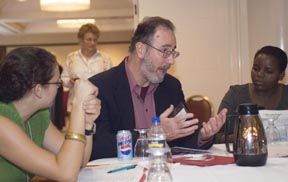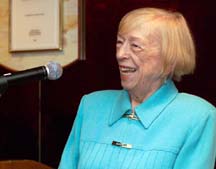Labor leaders urge students to seek careers that 'make a difference' in lives of others

More than 70 Cornell students from across campus discussed opportunities for careers in the U.S. labor and social justice movements with 18 labor leaders Sept. 16.
They were taking part in the Third Annual Labor Roundtable at Cornell University in the Statler ballroom, sponsored by the School of Industrial and Labor Relations.
Students wanted to know more not just about labor organizing but also about labor research, policy advocacy, labor law and union administration. Among the labor professionals they spoke with were Greg Junemann, president of the International Federation of Professional and Technical Employees; Steve Albrecht, director of the Service Employees International Union's (SEIU) Capital Stewardship Programs; Marija Kowalski, organizing coordinator with Writers Guild of America East; and Nancy Hoffman, general counsel to the Civil Service Employees Union's Local 1000.
Junemann, whose 90,000 U.S. and Canadian union members range from NASA scientists to defense employees, replied to a student who asked if there was a difference in employers' responses to blue- versus white-collar workers in organizing and bargaining: "Employers don't understand why professional workers want to be in a union, and they tend to oppose it. But we don't want to bring the boss to his knees -- only to his senses. It's not just about higher wages. Our job is to enlighten people about the quality of employees' work, to bring a voice to the workplace and make a meaningful difference to their lives."
Junemann's roots are blue collar. A former lathe operator and cost estimator who studied engineering in night school, he worked his way up from shop steward of a Milwaukee local to head his union. "My kids are in their 20s, and I've tried to instill in them the importance of making a contribution to society," he said. "Not only does it make your life fulfilling, but as a unionist you can make a difference in the lives of a heck of a lot of people."

Wes Hannah '06, a government major in Arts and Sciences who hopes to be involved in social justice efforts after he graduates, said: "I signed up for the chance to hear from these varied speakers and was not disappointed. [It] was an opportunity to learn more about the different possibilities [for careers] within the labor movement as well as hear accounts of interesting campaigns and successes."
Kjirsten Alexander '07, a human development major in Human Ecology, said of the roundtable: "I gained some insight about [career] options people can take and still have meaningful, successful lives." Alexander, who plans to work for the Peace Corps in Latin America, then study clinical psychology, also remarked on the diversity of students who attended. "Everyone at my table studied different things -- Africana studies, government, natural resources, human development."
Jordan Wells '07, an ILR student, said: "I was exposed to a variety of positions and programs in the labor movement which I hadn't known much about, like SEIU's Capital Stewardship Programs," which ensures pension assets are accountable to workers. Wells, who is president of the Cornell Organization for Labor Action (COLA) and hopes to work in the labor movement after graduation, said he was grateful for the chance to take part in the roundtable: "So few opportunities exist to interact with people whose professional mission is to fight corporate power and build the collective power of working people," he said.
Wells was among the students who helped organize the roundtable, with support from staff and such faculty members as Kate Bronfenbrenner, director of labor education research at the ILR School.
Following the roundtable, the ILR School honored a gift to the school's Credit Internship Program by Lois Gray, professor emerita and former associate dean, in memory of her late husband, Edward Gray. The youngest person elected to the United Auto Workers executive board, at age 26, Ed Gray was lauded for being an indefatigable champion of worker rights and a just society in remarks by ILR Dean Harry Katz and Denis Hughes, president of New York State AFL-CIO.
The Credit Internship Program, established three decades ago, allows ILR undergraduates to intern with labor organizations around the world for course credit, under the supervision of labor professionals. "The gift will support students working with activist trade unions and other organizations committed to economic and social justice," said Professor Clete Daniel, who directs ILR's Off-Campus Credit Programs.
The first Gray Award winners are Edward Yoo '06, now organizing low-wage service workers in London with GMB, one of Britain's largest unions; and Patrick Neville '06, currently working in Syracuse, N.Y., with Central New York AFL-CIO.
Media Contact
Get Cornell news delivered right to your inbox.
Subscribe